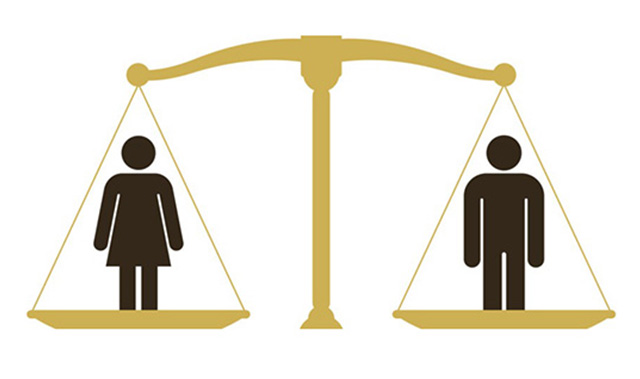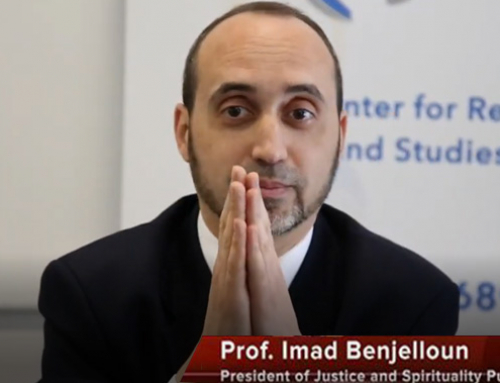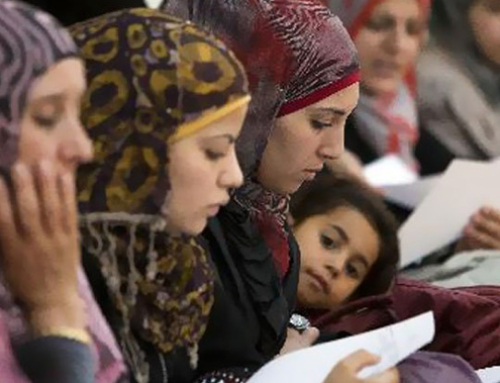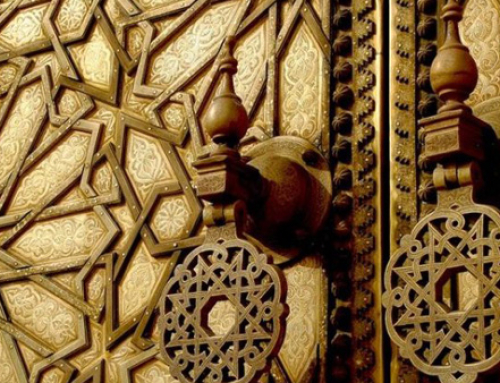Abdessalam Yassine
February 28, 2017
In a previous section, we read in ‹Umar’s account that the Emigrants accustomed to the traditions of Quraysh used to “dominate” their wives. When they immigrated to Medina, they found that the Supporters “were dominated” by their wives. Then, the women Emigrants learned from the women Supporters how to “wrestle” with their husbands for their rights, question their authority, and lodge their complaints to God’s Messenger, God bless him and grant him peace.
In that virtuous age, when the believing women and men were in the process of acquiring the prophetic education (social, moral, and spiritual), such argumentation did not cause conflicts, quarrels, and animosity. Rather, it was circumscribed by education and by the Qur’ān, which prescribed for men a “degree” above women. Men assumed the responsibility of such “degree” with gentleness, magnanimity, wisdom, love, and compassion. In her husband’s house, the believing woman was held in respect and dignity. Her rights were recognized. She could voice her opinion and plead for her rights in all freedom and confidence. She could have her complaints heard. Her Lord, Glorified is He, heard her plea, and her Messenger justly decided her case in case her oppressor was not a generous man who hastens to do good deeds and gives the weak their due in full and more.
Then, the Islamic societies declined and the woman, from her high dignified place, fell into utter humiliation; she resorted to silence—or rather was silenced—after she had been able to voice her opinion, and was bridled after she had been given free rein. She was restrained by a degenerated and narrow-minded jurisprudence. She was humiliated and muzzled by arbitrary men who misused the “degree” of responsibility which they turned into a “degree” of privilege and supremacy.
Today, the woman has become a lightweight in the “flimsily religious” Muslim society; a cipher just as in the society of the irreligious. So the Muslim women, who neither know their rights nor claim them, call for equality with men just as do the irreligious women among us whose allegiance ideologically and lifestyle wise is to the irreligious jāhiliyya.
The believing women and men are equal before God’s Law that came down to establish justice. No man or woman outweighs another except by piety. She—and he—will find the recompense of such superiority in the Balance of Good Deeds on Judgment Day. As to equality in rights and obligations here in this world, it is enforced by a comprehensive Law, firmly established like revolving orbits, and immutable like God’s universal laws. So if a change should occur, either by degeneration or aberration, in right-holders and in their social and global environment, the flexibility of ijtihād is to adapt their reality to the requirements of the Law through approximation, progressivity and the use of both the exhortative power of the Qur’ān and the executive power of the Islamic State. (1)
The “degree” that God, Exalted is He, gave to men over women by virtue of the explicit Qur’ānic text ostensibly gives superiority to men over women. While in fact, it is an addition to the responsibilities of men and an alleviation of the burdens on women to whom the Islamic Law has assigned a huge responsibility that is expounded directly and indirectly in the rulings related to the distribution of duties and responsibilities between men and women.
The “degree” is a position of leadership in the social, marital, and political caravan. It is like the leader on a journey, whose nomination the sunna recommended. It is a kind of leadership without which disorder will spread in the caravan. Weakened by disorder, enemies would attack the caravan and rend it apart.
The Muslim men abused the “degree.” So the Muslim women proclaim justice and female infiltrators, be they writers or orators, want to snatch leadership of the caravan from Muslim men in order to pass it to their lovers, or assume it themselves; presumed equality between men and women, a kind of democracy that tosses Islam out of social and political life, fickle laws that no constant and reliable principles could keep from trailing along the victorious bestial caravan.
What exactly are Muslim Women coveting in Western women’s acquired rights? The financial independence they are still panting after—an exceptionally remarkable right indeed if achieved? Let us suppose, for the sake of argument, that it has been partially achieved; at what price? If the Western woman has, through her activism and through social development, wrested from Western laws some measure of equality in wages, opportunities for education and social progress, the price she pays out of her humaneness is exorbitant. The sex revolution has turned her into a commonplace toy. What little laws Men have granted her thanks to her activism, they have managed to steal away from her manyfold, due to her psychological weakness.
On the woman’s global activist placard is inscribed in blazing letters: “Equality”. If you want, O believing women, to see that equality in the Western reality not on billboards of activism under the banner of feminism, you only have to see the condition of the Western doll. If a woman renegade argues with you, then ask her what hairdressers do with the hair of both the noble and the base Western woman, what makeup and perfume manufacturers and beauticians do with her face, what model makers do with her body’s geometry, what advertising and publicity do with her image and body’s poses, what music composers do with her voice, and what all those men do with her salary as a worker and with her being as an employee. What independence and what equality! Or rather, what enslavement and what exploitation!
Instinctively, Women lean toward Men. They wants to attract their attention by any means, win their admiration, fascinate them, and charm them. If the call of Islam does not channel and refine those instincts, if the woman does not find her physical happiness with one man—and can’t bring herself to comply with God’s Law—then the door is wide open for the struggle between men and women over wealth, beauty, and worldly pleasures. The victory in the ring—whatever may be the woman’s craft, conviction, ruse, culture, and academic degrees—will be to men through the law. Should her activism prevent him from such means, the woman’s psychological weakness is a most convenient means.
Either that illusory equality that rejects Islam or a comprehensive renascence—in the fields of education, sciences, ijtihād, economy, and politics—of Muslim men and women, and the environment. That is a decisive choice to be made by the believing women and men and by the dauntless force, in the vanguard of which the believing women and men will strive hard each in their spheres, and then marshal their efforts to defeat falsehood and despotism, and establish truth and justice.
The illusory path of beastliness is strewn with ever-changing variables: whatever imagination can muster, whatever is favored by public opinion polls, whatever is publicized by advertising campaigns, and ratified by the devil, is defined as progress and civilization.
In our dīn we have the invariable principle of believing in God (our Lord) and adhering to His Prophet’s sunna, and we have the variable principle of flexible ijtihād. How can a self-respecting human mind then let itself be swayed by the postulates of wandering beasts that do not know for what purpose they were created? Is it not more proper for it to ignore their infirmities?
Among the principles established by the Islamic Law in marriage is equivalence between the two spouses. How is such equivalence gauged? What is the criterion used? If we put the Qur’ān on the shelf, keep the Prophet’s sunna tucked away in books, view our living reality with the eyes of the dead, despair of ridding ourselves of the residues of jahiliyya and fail to repair the damage they cause, then the criteria of equivalence are wealth and social status: the wali (2) marries off his young daughter to a rich, influential old dignitary. The young woman runs after wealth and social status, and her own family leads her to the marital grave wherein she dwells until the old rich man is escorted to his tomb and she inherits money and land.
Yet if we read the Qur’ān, examine the sunna carefully, and put the two scales of marital equation and equivalence in the balance wherein both the values of this world and the hereafter are weighed, it will tip in favour of the hereafter just as they do in the sight of God. By such measure, the marriage of the middle-aged Prophet, God bless him and grant him peace, with the young ‹Ā›isha will then prove to be sheer triumph for ‹A›isha—an eternal triumph that cannot be grasped by those materialistic worldly women who decry the loss of her worldly happiness. The same criteria apply to any pious man who marries a pious woman: the criteria of inequality in age, wealth, and social status are nullified while the criteria of eternal happiness prevail, if God grants them His mercy and satisfaction, and joins them as husband and wife in Paradise.
The criterion of marital equivalence is specified by God’s Messenger, God bless him and grant him peace, who said: “When someone with whose din and character you are satisfied asks to marry your daughter, grant him his wish. If you do not do so, there will be corruption and great evil on earth.” The ḥadīth is reported by al-Tirmidhi on the authority of Abu Hurayra (God be pleased with him).
The leading advocates of Westernization condemn loud and clear Islam’s alleged injustice to the woman in that the Islamic Law made her share of inheritance half that of the male heir.
If you extract that ruling of the Islamic Law from its comprehensive Islamic context, it sure appearss of blatant and obvious injustice and inequality. But if you consider that ruling in its wider context, you will discover that the Islamic Law treated the woman generously when it granted her a share in inheritance that she is free to save for the vicissitudes of time, invest freely in times of need, or spend for the cause of God. As to the expenses related to her subsistence, clothing and accommodation, and all her other expenses, it is the financial responsibility of her father when she is a minor or widow, and of her husband when she is married. (3)
The people of jāhiliyya in the Arab Peninsula used not to allot any share in inheritance to women, not a single penny. The laws of modern jāhiliyya authorize the rich man to bequeath billions of dollars to his dog. The dog then lives a life of luxury with a bevy of attendants at its service, among other pampered and well-fed dogs, adopted as children, and treated like royalty.
The malicious enemies of Islam protest loudly that the Islamic Law prescribed the blood money for the murdered woman as half that of man. That further corroborates in their view the allegation that the woman is worth half a man in Islam.
That too is a fallacy because the half of the blood money is payable for the woman in the case of second degree murder. In the case of first degree murder, the blood money is the same for the man and woman alike: full equality in first degree murder because a human’s soul and worth are one, none is worth more than another. But in the case of second degree murder, the family of a murdered man, who is the breadwinner, suffers heavily on account of the loss of his earning. On the other hand, the woman murdered without premeditation has male family members who care for her financially.
In a proper Islamic context, the question of “who the breadwinner in a family” is settled.
The allotted shares of the man and the woman in inheritance, and the woman’s half share in the blood money indicate that the man is the one who assumes the family’s financial duties so that the woman may dedicate herself to bearing man in her womb, giving birth to him, raising him, and making him fully human. If she is compelled to care financially for herself owing to the corruption of her environment, poverty, misery, and the division of the world into a starved South and an obese North, she is then a victim of the world’s corruption.
If she is forced to earn her living for fear of man’s injustice, avarice, capriciousness, and arbitrary repudiation, she is then driven out of her tower by a perverted and immoral man. Din and noble manners are the criteria of equivalence. If either or both are lacking in the man or the woman, the family and the society will then lose their balance, break up, and fall into disorder. God does not love the unjust.
Islam allotted to each Muslim man and woman their due rights and specific shares. Companion ‹Abdullah ibn ‹Amr used to fast everyday and offer supererogatory prayers every night. God’s Messenger, God bless him and grant him peace, advised him: “Fast some days and eat on other days, sleep some time and offer supererogatory prayers some time. For you owe your body a right, your eyes a right, your wife a right, and your visitors a right.” The ḥadīth is reported by al-Bukhari and Muslim.
Salmān, whom God’s Messenger, God bless him and grant him peace, associated as brother with Abū l-Dardā’, once visited his brother and noticed that [his wife] Umm ad-Dardā’ was not well turned-out. Complaining about her husband, she said: “Your brother Abū d-Dardā’ has no interest in this world!” She complained to him about the rights her husband owed her as he fasted everyday and offered supererogatory prayers every night. The acts of worship absorbed him and kept him from pleasuring his wife with her rights. His brother Salman corrected him by the Prophet’s recommendation and counsel to give to each his due right. The story is reported by al-Bukhāri and at-Tirmidhi on the authority of Abū Juḥfa.
This is a woman Companion who complains about her husband for her personal rights, and that is a Companion who corrects his brother. The woman Companion’s patience had limits just as her husband’s knowledge and understanding were limited.
Then, if we take a look at the Prophet’s home—the home of knowledge, virtue, and exemplary conduct—we will discover the solidity of the Islamic home, the cohesiveness of the Islamic family, and mutual co-operation between the husband and the wife who endure the hardships of life in their most express, evident, and intense manifestations.
In his Musnad, Imām Aḥmed reported on the authority of Imam ‹Alī (God honor him) that when God’s Messenger, God bless him and grant him peace, married him to the Best of Women (4) Fāṭima (God be pleased with her), her trousseau consisted of a woollen blanket, a leather pillow stuffed with palm-leaf fiber, two hand mills, a water skin, and two jars. That is the whole trousseau of the daughter of God’s Messenger, God bless him and grant him peace, and her share from worldly belongings.
She (God be pleased with her) used to grind cereals with the hand mill until her hands swelled and blistered. When the Prophet, God bless him and grant him peace, received monies one day, ‹Ali sent her to God’s Messenger, God bless him and grant him peace, to ask him for a woman servant to help her. She felt embarrassed to broach the subject with her father. ‹Ali then went to God’s Messenger, God bless him and grant him peace, and said: “O Messenger of God! I kept drawing buckets [of water] from wells until my chest ached.” He (God be pleased with him) used to work as a day laborer drawing water from wells. He once worked for a Jew and earned one date for each bucket.
He related to God’s Messenger, God bless him and grant him peace, how the noble hands of Fatima swelled and blistered on account of turning the flour mill. God’s Messenger, God bless him and grant him peace, declined to give them something while ignoring the needs of ahl aṣ-Ṣuffa (5) , some three hundred poor Muslims who had no shelter other than the mosque. He, God bless him and grant him peace, then went to Fāṭima’s home. She and her husband were under a blanket so small as to when pulled over their heads would leave their feet uncovered. He taught them, just as Gabriel taught him, to say after each regular prayer: subḥan Allāh (Glory be to God) ten times, al-ḥamdu li-llāh (Praise is due to God) ten times, and Allāhu akbar (God is Supremely Great) ten times. And when they go to bed, he, God bless him and grant him peace, taught them to say: subḥan Allāh, al-ḥamdu li-llāh, and Allāhu akbar thirty-three times each. They had asked him for worldly belongings and worldly help, and he guided them towards heavenly assistance.
References
| ↑1 | [Translator’s note:] In Imām Yassine’s revivalist project, the Mission of the Islamic movements combines the affairs of the State (i.e. addressing the social, economic, political, and cultural issues of the Islamic society so as to enable its members to live a life of dignity) and the Call (i.e. educating the individuals morally and spiritually, and preparing them for the great journey towards the hereafter, towards God). |
|---|---|
| ↑2 | [Translator’s note:] Wali, mistranslated as male guardian, means a friend or a supporter. Contrary to the chauvinistic view that makes him a guardian of the woman, the wali is expected to act as a counterbalance to the woman’s future male in-laws and to assist the woman in her choice, not decide on her behalf or without her consent. |
| ↑3 | [Translator’s note:] In other cases, it is her family and in the last resort the State which undertake the woman’s financial responsibility. |
| ↑4 | [Translator’s note:] God’s Messenger, God bless him and grant him peace, said: “The best women of Paradise are: Khadīja daughter of Khuwaylid, Fāṭima daughter of Muḥammad, Āsiya daughter of Muzāḥim (wife of Pharaoh), and Mary daughter of ‹Imrān (God be pleased with them).” Ḥadith reported by Imām Aḥmad on the authority of ‹Abdullāh ibn ‹Abbās (God be pleased with them). |
| ↑5 | [Translator’s note:] Literally, “the people of the stone bench”. |









